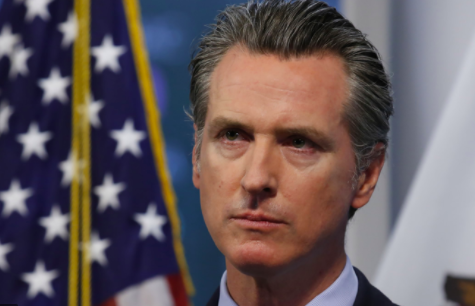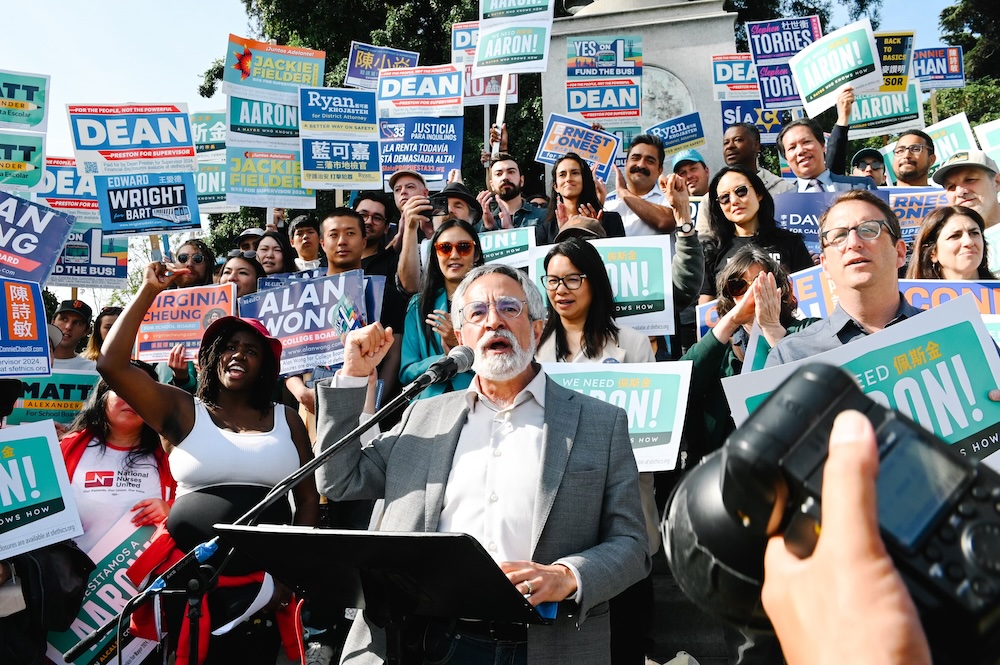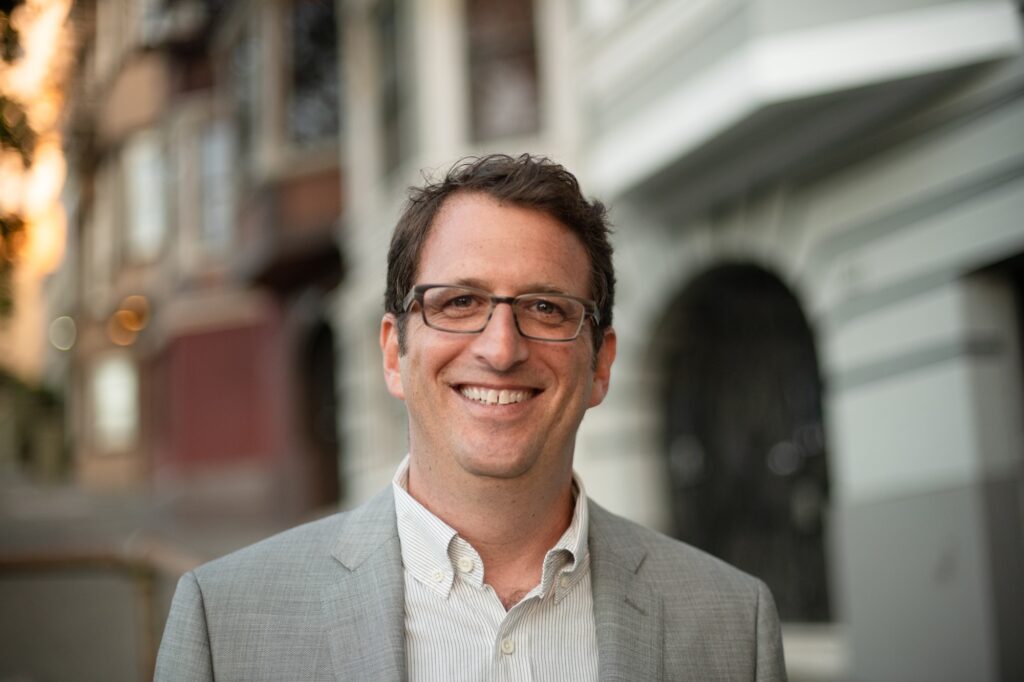Gov. Gavin Newsom says that state is making progress on homelessness, even though the numbers continue to climb. From the Chron:
“Forty states saw larger increases than California,” Gov. Gavin Newsom said during a news conference in Oakland on Friday. “We’re making progress, but we have to continue to do more. … That state has provided unprecedented support and flexibility. Local government has to deliver.”
Ummm …. homelessness is increasing, and it’s the fault of local government?

Dick Platkin, a retired Los Angeles planner, has a great piece in a city planning journal that points out why Newsom is totally wrong, and why homelessness keeps increasing despite the billions of dollars cities have already spent:
The problem is NOT a housing shortage. Even though well-funded pressure groups, public officials, and the corporate media endlessly repeat this bogus claim. What they rarely say, however, is that the basic problem is a lack of low-priced housing, and that private sector solutions only make the low-priced housing shortage worse.
For example, in San Jose there are 11 empty housing units for each homeless person, and in San Diego there are three (3) empty housing units for each homeless individual. Since some people have roommates, spouses, or partners, the ratio of vacant houses and apartments per homeless persons is actually higher. As for Los Angeles, the ACCE Vacancy Report documented 93,000 vacant housing units, half of which are withheld from the housing market. This is more than LA’s 45,000 homeless people.
Actually, Platkin says, the problem is Elon Musk:
If a housing shortage is not the underlying cause or the housing crisis, then what is?
A good place to look is the wealth of the President-elect’s first buddy, Elon Musk. According to the Bloomberg Billionaires Index, Musk has a fortune of $447 billion, which makes him the world’s richest person.
To better understand this vast accumulation of enormous wealth at the very top, like Musk’s, we need to realize that most of it has appeared since 1980. The fortunes of the top .01 percent increased by 800 percent in this period. The rest of the population were stuck in place because of inflation.
This enormous redistribution of wealth and income upward is primarily responsible for the twin crises of homelessness and overcrowding. This is because the price of housing has increased much faster than the consumer price index, a crude government measure of inflation.
Platkin notes that local efforts to end homelessness (or to blame it on drug use) are never going to succeed until we as a nation (and a state, and a city) address radical economic inequality.
Newsom has said nothing about that.
I am going to miss the outgoing members of the Board of Supes. It’s easy to take for granted how generally effective and progressive the board has been over the past four years (despite being unable to make many of the changes that are needed thanks to a powerful mayor who kept trying to block the progressive agenda).
Let’s go in alphabetical order, to avoid any appearance of bias:
I am going to miss Sup. Aaron Peskin because, while we sometimes disagreed, Peskin knew how to run a city. In fact, for much of the past two years, Mayor London Breed wasn’t doing her job, and the most significant policy measures were all coming out of the board, with Peskin as president. He is a brilliant strategist, who could always play three chess moves ahead of his opponents, and he was relentless about fighting corruption. His successful move to create an Office of the Inspector General could be among his greatest successes.
Peskin isn’t and never has been a hard-core leftist; in European terms, he would probably be categorized as “center left.”

But he’s been a leader on a long list of progressive legislation—and most important, in an era when Big Tech wants to have its way with local government, Peskin is someone who has always believed in regulation. He fought Uber and Lyft when they set out to destroy the taxi industry (and impoverish its workers). He fought Airbnb when it set out of turn housing into hotel rooms and displace thousands of tenants. He was always opposed to efforts to undermine the California Environmental Quality Act and give special favors to developers. He passed the most extensive new rent control law in decades. He helped save the historic Flower Market and stop massive construction on the waterfront.
He’s also been one of the most accessible politicians in my 40-plus years as a reporter in the city—and hundreds of other journalists and activists will agree with me. The guy never needed a press spokesperson; he answered his own phone, and talked to everyone, even the reporters and activists who disagreed with him or challenged him.
He supported and followed and promoted the California Public Records Act and the Sunshine Ordinance; I never, ever had problems getting information from his office.
Mayor Dianne Feinstein refused to talk to reporters who were critical. Mayor Willie Brown was the same, as was Mayor Gavin Newsom; they all treated the press as their enemies. Mayor London Breed was probably the worst. It was a nightmare, often requiring legal action, to get even basic public records from their administrations.
On that front, Mayor Aaron Peskin would have been a breath of fresh air.
I will miss Sup. Dean Preston because he, unlike so many others at City Hall, understood that economic inequality is a fundamental threat to society, and that local government is part of the solution.
When Preston first took office, he pestered the Mayor’s Office about more affordable housing. The response: We don’t have the money.
So he set out to get the money—and succeeded. He promoted Prop. I, a measure to raise taxes on the very rich, in this case real estate transactions of more than $10 million, and that’s brought in more than $300 million.

Breed, in her bitter vindictiveness against Preston, who ran against her and later beat her hand-picked successor, refused to spend that money.
But from the start of his career in office, he kept pushing for ways to bring in money from the big corporations and rich individuals, and to protect tenants and unhoused people and vulnerable populations.
He did amazing constituent service and community work, despite the mayor’s efforts to undermine him: He got SRO elevators fixed, brought rent control to Midtown, got 372 units of affordable housing set for the old DMV office, and essentially forced the Mayor’s Office to apply for federal grants for 4,000 more affordable units.
He was also one of the best I’ve ever seen at holding the mayor’s appointees accountable in public sessions. Week after week, in hearing after hearing (and at Question Time), he politely but clearly demanded that the decision makers explain themselves and their policies (or the lack thereof). He used the Budget and Legislative Analyst’s Office to bring critical policy issues to light:
Preston: “Is it fair to say that we should be using every possible source of revenue for affordable housing?” Prop. I has generated $250 million, and will bring in about $100 million more every year. “How much of that has MOHCD requested?”
Benjamin McCloskey, deputy director: “It has not been a formal request.”
Preston: “The Planning Department has recommended that the city use [that] revenue stream to address the funding gap.”
McCloskey: “I can’t speak on MOHCD’s behalf.”
Preston: “Is MOHCD committed to using the Prop. I revenue?”
McCloskey: “We will deploy all the revenue that the mayor and the supervisors appropriate.”
And the mayor won’t spend that money, so the answer is no.
Preston asked Ely if MOHCD has a plan to start buying land for future affordable housing. That’s something the advocates have been pushing, and in fact MOHCD has $40 million in the bank that is hasn’t spent.
Ely: “We’d like to buy, but we don’t have money to build on those sites.”
Preston: “We were told there was no money, so the board and the voters chose to tax the hell out of rich people to get that money, but we get nothing but pushback … we have to have this battle every year.”
And he did it all with a sense of humor and in good spirits, even when things looked bleak.
I will miss Hillary Ronen because she was the conscience of the board. She never wavered, never backed down from her beliefs. She had a long record of legislative success, but she, unlike so many politicians, had no problem calling out the rich and the powerful. She called out the landlords and some of her colleagues:
“What’s going on with the measure irks me to no end,” Ronen said. “The games they play, these fantastical hypotheticals to hide the fact that they hate rent control. It’s sad to see our colleagues play into that. Be honest: You oppose rent control because the real estate industry is giving you a lot of money.”

She called out the Mayor’s Office of Housing:
Ronen said she has been trying to two years to get the city to deal with the issues around 1515 South Van Ness, which in a couple of years will be an affordable housing project. “You keep pointing fingers,” she said. “It doesn’t work if somebody isn’t in charge. Something’s deeply wrong with the system.”
When the plutocrats, led by Ron Conway, tried to bully the supes into making Breed the interim mayor in 2018, she made the case clearly, in a speech I will never forget:
“Right now we need to turn our city upside down. San Francisco has become a place where only the ultra-elites can prosper, where the gap between the rich and the poor keep getting wider and the middle class has no place.
“These changes for the worse didn’t happen by accident. During the last two administrations, the same tech moguls and real estate billionaires have been making money off our staggering high rents. They champion policies that decimated the African American community and are doing the same thing to the Latino community.
“We need a radical change in the direction of the city. So far, the dominate narrative has been about the identity of London Breed, how as an African American woman with such a dramatic narrative should be the next mayor of the city. And I agree that it’s impossible to talk about fairness and advantage when you talk about an African American woman.
“But I also have to say, and let’s be honest, although it’s painful for a lot of us, there are white rich men billionaires in this city who have steered the policies that have gotten us into the mess we have have gotten into today, it’s ridiculous and outrageous, and it keeps me from sleeping as a supervisor every night. And I hate to say it, that these same white men are enthusiastically supporting London Breed. They are threatening people who don’t support London Breed. They are saying peoples’ careers will be ruined. That is the grossest part of politics and it’s happening right now right here as we are speaking.
It started happening the morning Ed Lee passed away because that’s how gross these people are.
She stood up against the mayor on police issues. She stood up for the neighborhoods. To her last days on the board, she worked for the most vulnerable, including the victims of wage theft.
Like Preston, she was dynamite in public hearings. And her staff was legendary for solving problems facing her most vulnerable constituents.
Let me say a word about Ahsha Safai. I often disagreed with him, and he had a habit of trying to delay or kill pro-tenant measures. But in quite a few cases, after a lot of wrangling, he was willing to vote with the progressives, particularly on labor issues. He was also unerringly polite and responsive to me, even when I was strongly critical of his positions. Given how many of the supes simply cut off communications with anyone who challenges them, I will always appreciate that.
Supporters of Ronen are holding a goodbye and celebration roast Thursday/9 at El Rio, 3158 Mission, at 7pm. It’s free, but Ronen is asking for donations to the strike fund for the hotel workers who were out on the streets for more than three months; you can donate here.
Peskin’s friends are holding a party for him Tuesday/7 at Club Fugazi, 678 Green Street, a 6pm. Again, admission is free.




